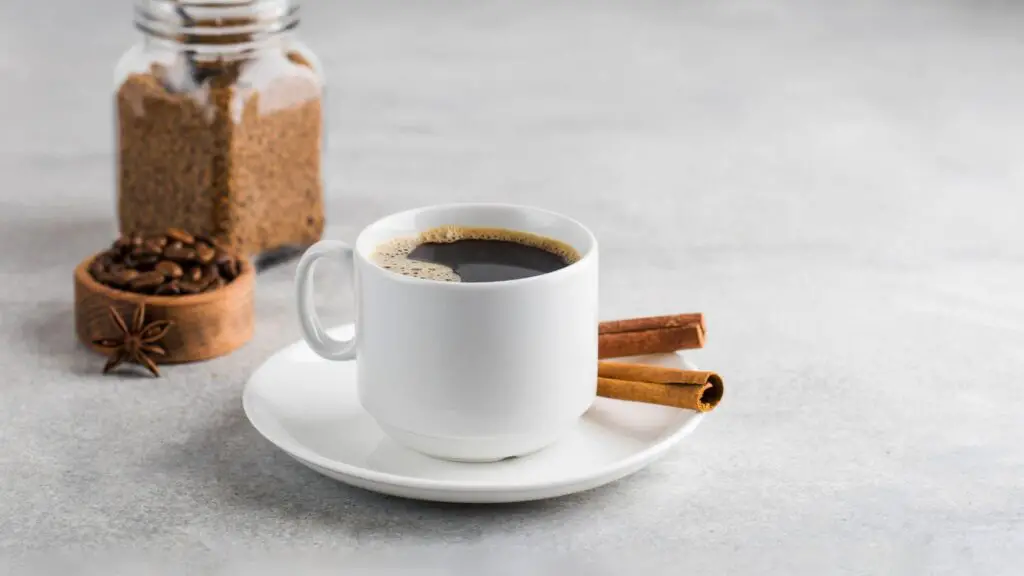For many of us, coffee is essential to our daily routine. It kickstarts our day, keeps us alert and focused, and offers many health benefits. But for some, the laxative effect of coffee can be a significant drawback, leading to unexpected trips to the bathroom and feelings of discomfort. If you’re one of these people, fear not! You can take steps to minimize the laxative effect of coffee and still enjoy your favorite brew without worrying about it making you poop. In this blog post, we’ll explore some tips and tricks to help you manage coffee’s laxative effects and ensure it doesn’t interfere with your daily routine. So, how to stop coffee from making you poop?
Why Does Coffee Have A Laxative Effect On Some People?

Coffee is a popular morning beverage for millions of people worldwide, but for some, it has a surprising side effect: it can make them need to poop. The reason for this laxative effect is still a mystery, but researchers have found several factors that may be at play. Compounds found in coffee, including caffeine, can stimulate the digestive system, leading to faster transit times and more frequent bowel movements.
Additionally, coffee’s acidity can trigger a reaction in the gut, causing contractions and movements that help move waste through the body. Milk and other additives can also contribute to the laxative effect, as can the time of day the coffee is consumed. Despite this somewhat uncomfortable side effect, drinking coffee has many potential health benefits, including a lower risk of several chronic diseases.
So if you’re one of the lucky 30 percent of coffee drinkers who experience a boost in bowel movements after your morning cup, you can rest assured that you’re not alone – and that your daily indulgence could be doing your body some good.
Why Can’t I Stop Pooping After Drinking Coffee?
Many people experience the need to poop after drinking coffee, and this can be quite a common reaction. While it doesn’t affect everyone, a significant number of individuals feel the urge to use the bathroom after consuming coffee. The reason behind this is the chemical makeup of coffee, which stimulates the secretion of gastrin, a hormone that triggers the muscles in the colon. This, in turn, can lead to bowel movements for some people, sometimes resulting in the need to use the restroom shortly after drinking coffee.
It’s worth noting that coffee doesn’t cause everyone to poop. The reaction can vary from person to person, and while caffeine is often assumed to be the sole culprit, studies have shown that it’s not just about the caffeine content. Decaffeinated coffee can also have a laxative effect on some individuals. Other factors, such as dairy products or the acidity of the coffee, may contribute to the need to poop after drinking it.
Research has shown that coffee stimulates the release of hormones that affect the digestive system, including the stomach and small intestine. When consumed, coffee triggers the production of gastrin and cholecystokinin hormones, stimulating the gastrocolic reflex and promoting bowel movements. These hormones also enhance the peristalsis or the movement and contraction of the colon and rectum. Essentially, coffee activates the gut in a similar manner to eating a large meal, resulting in the urge to eliminate waste.
Lactose intolerance can also play a role in needing to poop after drinking coffee. Around 65% of people have difficulty digesting lactose, a sugar found in milk. Consuming dairy products, creamers, or sweeteners in your coffee can trigger gastrointestinal symptoms, including the need to use the bathroom.
Ultimately, the exact reason for experiencing frequent bowel movements after drinking coffee can vary from person to person. It could be a combination of factors, including the compounds in the coffee itself, the dairy or sweeteners added to the coffee, and individual sensitivities or health conditions. Adjusting your coffee consumption, such as switching to decaf or reducing dairy products, can help alleviate this issue. Ensuring adequate hydration and fiber intake can promote healthy bowel movements and overall digestive health.
How Long Does Coffee Laxative Effect Last?
The laxative effect of coffee usually lasts for at least 30 minutes, according to a study mentioned in the Cleveland Clinic article. Researchers found that the involuntary muscle contractions stimulated by the acids in coffee start within four minutes of drinking it and continue for at least half an hour. This effect applies to both regular and decaffeinated coffee. While caffeinated coffee has a more potent effect, decaf coffee can also help move things along due to its natural acids. It’s worth noting that adding cream or milk to your coffee may trigger extra activity in the gut, particularly for those with lactose intolerance. However, if you’re experiencing difficulty with regular bowel movements, using coffee as a natural laxative can be a simple and effective solution. Maintaining regular and healthy bowel movements is important to avoid discomfort and potential digestive issues.
Should I Stop Drinking Coffee if It Gives Me Diarrhea?
If drinking coffee gives you diarrhea, it may be a good idea to consider some alternatives or make changes to your coffee-drinking habits. Coffee contains caffeine and theophylline, which can stimulate contractions in your colon and intestinal muscles. This increased activity can make bowel movements more frequent and potentially lead to diarrhea.
You can try to stop the coffee from making you poop in several ways. Firstly, you can try drinking less coffee or opting for decaf coffee to reduce your caffeine intake. Additionally, having a small meal or snack before drinking coffee can help. This helps buffer the caffeine’s effects and reduce the risk of diarrhea.
It’s also worth considering the type of coffee roast you choose. Highly acidic coffees can be more likely to cause digestive issues, so switching to a low-acid variety or opting for Arabica beans, which have a lower acid content, might be helpful.
If you add milk or other dairy products to your coffee, it’s possible that lactose intolerance could be causing or contributing to your diarrhea. Lactose intolerance affects a large portion of the population, and consuming dairy products can lead to digestive issues like diarrhea. Trying alternative milk options or eliminating milk from your coffee for a period of time may help determine if it’s the culprit.
If these changes don’t alleviate your symptoms, it may be best to consult a healthcare professional for further guidance. They can help determine if there are any underlying conditions contributing to your diarrhea and provide appropriate recommendations. Everyone’s body is different, and what works for one person may not work for another. It’s important to listen to your body and make choices that promote your overall health and well-being.
Is Coffee a Laxative for Everyone?
Coffee may have a laxative effect on some people, but it doesn’t necessarily act as a laxative for everyone. While it’s true that coffee stimulates bowel movements, it is not recommended as a primary solution for relieving constipation. Caffeine, which is present in coffee, can potentially dehydrate the body, making constipation worse. It is more advisable to drink water to combat constipation.
The reason why coffee can make some people poop is due to its composition and the way it interacts with the digestive system. Coffee contains acids that stimulate involuntary muscle contractions in the stomach, helping to move feces along the intestines. This effect can happen whether the coffee is caffeinated or decaffeinated, although decaf coffee may not be as potent.
Additionally, adding milk or cream to coffee can also contribute to the urge to poop, especially for lactose-intolerant people. Lactose sugars and fats present in dairy products can affect the intestinal tract and transit time, causing diarrhea and other gastrointestinal issues.
Not everyone reacts to coffee in the same way, as some individuals may be more sensitive to its effects. People with certain health conditions or medications may have a heightened response to coffee, leading to increased bowel movements. However, some coffee drinkers may develop a tolerance over time, and the laxative effect may diminish or disappear entirely.
Coffee can be a helpful tool for those who struggle with regular bowel movements. It can stimulate the digestive system and facilitate transit time, aiding in the elimination of waste. However, it’s essential to remember that coffee should not be relied upon as the only method for regular bowel movements. A balanced diet, hydration, and proper fiber intake are also crucial for maintaining a healthy digestive system.
In conclusion, coffee can act as a natural laxative for some people due to its composition and effect on the digestive system. However, it is not a recommended solution for constipation, and excessive consumption of caffeine can lead to dehydration. As with any dietary habits, individual responses may vary, and it is essential to find what works best for maintaining regular bowel movements and overall gut health.
How Much Coffee To Drink Not To Get Poop?
According to factual data, limiting coffee consumption is recommended to avoid experiencing bowel movements. However, it is important to note that the amount of coffee that causes this effect can vary from person to person. As a general guideline, health experts suggest consuming no more than 400 milligrams of caffeine per day, equivalent to approximately four cups of coffee. Drinking plenty of water and avoiding consuming coffee on an empty stomach are also recommended, as these practices exacerbate the issue.
It’s best to listen to one’s body and consume coffee in moderation to ensure comfortable and healthy digestion.
How To Stop Coffee From Making You Poop?
If you’re one of the many people who love their daily cup of coffee but dread the digestive discomfort that comes with it, fear not – there are ways to enjoy your brew without worrying about stomach upset or that sudden urge to use the bathroom. One option is to try adding eggshells to your coffee grounds. These alkaline shells can help neutralize the acid in your coffee and reduce the likelihood of stomach irritation. Another approach is to eat something before you drink your coffee.
Consuming food and your morning brew can help mitigate the effects of the caffeine and acids in coffee, reducing your chances of experiencing unpleasant digestive symptoms.
Finally, you still struggle with coffee-induced bowel movements or stomach discomfort. In that case, you should experiment with different blends or brewing methods to see if you can find a milder option that agrees with your body.
These steps allow you to enjoy your coffee without worrying about unwanted side effects.
Read more:
- Is Coffee Good for Sore Throat? The Facts
- Intermittent Fasting and Coffee with Milk – Does It Break a Fast?
- Pantoprazole and Coffee: Can You Drink It Safely?
- The Laxative Effect Of Coffee: How To Stop Coffee From Making You Poop?
- Coffee And Iron Absorption: How Long After Taking Iron Can You Drink Coffee?
Identifying If You Are Sensitive To Coffee’s Laxative Effect
Many people start the day with a cup of coffee, a typical routine. However, coffee consumption can have a laxative effect on some individuals, leading to discomfort and inconvenience. If you experience sudden bowel movements or loose stools after drinking coffee, you may be sensitive to its laxative effect. To determine if coffee is the culprit, you can start by monitoring your coffee intake and observing your body’s reaction.
Try reducing the amount of coffee you drink or switching to decaffeinated variants. You can also consider trying different brewing methods or coffee brands until you find a blend that works well with your digestive system. Remember to stay hydrated, consume a balanced diet, and seek advice from a healthcare professional if symptoms persist or worsen.
With patience and experimentation, you can identify if you are sensitive to coffee’s laxative effect and enjoy your caffeine fix without compromising your comfort.
Tips To Reduce The Laxative Effect Of Coffee
- Switch to a darker roast or reduce the amount of caffeine in your coffee.
- Avoid adding milk to your coffee; choose almond or coconut milk alternatives.
- Don’t drink coffee on an empty stomach. Eat something heavy and stable like water, bread, cereal, or fruits.
- Drink plenty of water to stay hydrated and reduce the dehydrating effects of caffeine.
- Avoid drinking too much coffee, which can lead to dehydration and exacerbate constipation.
- Reduce general toxicity in the body by adding some natural remedies to your daily routine.
- Don’t rely on coffee as a laxative to relieve constipation, which can lead to dehydration and other health issues.
- Studies have shown that decaf coffee can still have a laxative effect, so try to reduce overall coffee consumption if necessary.
- If the bowel-stimulating effects of coffee are particularly bothersome, try eating food alongside it to reduce its impact.
- Consult a healthcare professional if you are experiencing chronic constipation or other digestive issues.
When To See A Doctor If Coffee Continues To Cause Digestive Issues?
If coffee continues to cause digestive issues, it is recommended to see a doctor. While drinking coffee can increase the movement of the intestines and colon, it can also cause other problems in the digestive system, such as acidity. If signs and symptoms persist, it is best to stop taking any medications causing the symptoms and consult a doctor.
It is important to note that doctors usually use advanced enteroscopy to assess and diagnose problems in the small intestine. In contrast, upper GI endoscopy can diagnose problems in the esophagus, stomach, and duodenum. These digestive issues can cause discomfort and other health problems if left untreated.
Therefore, reaching out to a medical professional for proper diagnosis and treatment is essential to ensure good digestive health.
Alternative Drinks To Coffee

Plenty of coffee alternatives exist for those looking to switch up their morning routine. One excellent option is green tea, particularly matcha. This tea is delicious and contains caffeine and various antioxidants that provide a quick energy boost. Another option is lemon-ginger tea, which is both invigorating and refreshing. Redbush (Rooibos) tea and black currant, fennel, and rose teas are all great options for those who want to avoid caffeine altogether.
Juices made from fresh fruits and vegetables are also an excellent choice, particularly those made from spinach, cabbage, mango, berries, and bananas. These juices are packed with vitamins and other nutrients that will give your body the energy and sustenance needed to start the day. And finally, for a healthy alternative to coffee, why not try a warm ginseng drink? This tasty concoction offers a range of health benefits and is a great way to kickstart your day.
Of course, coffee does have its benefits, but it’s always good to mix things up and try out some of these alternatives.
FAQ
Q: Why does coffee make you poop?
A: Coffee, both regular and decaf, contains a compound called chlorogenic acid that can increase gastric acid production and promote bowel movements. Additionally, caffeine is a known stimulant that can increase colon motility and thereby contribute to the laxative effect of coffee.
Q: What can you do to reduce the laxative effect of coffee?
A: You can try several strategies to reduce the likelihood of coffee causing you to poop. Switching to decaf coffee can help, as decaffeinated coffee contains less caffeine. Drinking water alongside your coffee can also help to counteract the laxative effect. Avoiding milk in your coffee and choosing non-dairy alternatives can also reduce the likelihood of coffee causing a bowel movement. Eating something heavy and stable like bread or fruit, with your coffee can also help slow digestion and reduce the laxative effect.
Q: Does decaf coffee also have a laxative effect?
A: Decaf coffee can still cause a laxative effect as it contains chlorogenic acid, which stimulates the bowels. However, decaf coffee generally contains less caffeine than regular coffee, which can reduce its laxative impact.
Q: Can coffee have different effects on different people?
A: Yes, the laxative effect of coffee can vary from person to person. Some individuals may be more sensitive to caffeine or chlorogenic acid than others, leading to a stronger laxative effect. Factors such as diet, hydration levels, and overall gastrointestinal health can also influence how coffee affects the bowels.
Read more:
- Can Coffee Make You Nauseous? How To Manage Your Caffeine Intake
- How Soon Can You Drink Coffee After Taking Omeprazole?
- Can I Drink Coffee While Taking Meloxicam? Risks and Benefits
- Is Decaf Coffee a Diuretic or Not? The Truth Behind the Myth.
- Can You Drink Coffee After a Tooth Extraction? Here’s the Answer
Conclusion
Thanks for joining us for this informative article on the laxative effect of coffee. Hopefully, you learned some helpful tips for reducing the likelihood of coffee causing you to poop. If you have any other questions or additional strategies for managing this common issue, please share them with us in the comments section below. Cheers to enjoying our beloved coffee without any unwanted side effects!
References
- https://www.cnn.com/2022/04/04/health/why-does-coffee-make-you-poop-wellness/index.html
- https://www.wikihow.com/Stop-Coffee-from-Making-You-Poop

James Robinson loves coffee and blogging all about coffee. His blog is full of informative posts about the best ways to enjoy coffee and the many different types of coffee out there. He also shares recipes for delicious coffee-based dishes, and his followers can always count on him to offer tips on how to improve their coffee-making skills.
